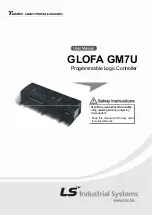NOTE
For this device, some of the properties of the GetProperty and
SetProperty commands are not available. These items are
reserved, which includes: FlashBlockCount (Tag value: 06h),
ReservedRegions (0Ch), ValidateRegions (0Dh),
RAMStartAddress (0Eh), RAMSizeinBytes (0Fh),
SystemDeviceId (10h), UniqueDeviceId (12h), FacSupport
(13h), FlashAcessSegmentSize (14h) and
FlashAcessSegmentCount (15h). For more information, see the
table
.
22.2 Introduction
The Kinetis bootloader is the program residing in the on-chip read-only memory (ROM)
of a Kinetis microcontroller device. There is hardware logic in place at boot time that
either starts execution of an embedded image available on the internal flash memory, or
starts the execution of the Kinetis Bootloader from on-chip ROM.
The Kinetis Bootloader’s main task is to provision the internal flash memory with an
embedded firmware image during manufacturing, or at any time during the life of the
Kinetis device. The Kinetis Bootloader does the provisioning by acting as a slave device,
and listening to various peripheral ports where a master can start communication.
For the Kinetis device, the Kinetis Bootloader can interface with I2C, SPI, and UART
peripherals in slave mode and respond to the commands sent by a master (or host)
communicating on one of those ports. The host/master can be a firmware-download
application running on a PC or an embedded host communicating with the Kinetis
Bootloader. Regardless of the host/master (PC or embedded host), the Kinetis Bootloader
always uses a command protocol to communicate with that host/master. Commands are
provided to write to memory (internal flash or RAM), erase flash, and get/set bootloader
options and property values. The host application can query the set of available
commands.
On start-up, the bootloader reads optional configuration parameters from a fixed area on
flash called the bootloader configuration area (BCA). These parameters can be modified
by the write memory command or by downloaded flash image. BCA parameters include
configuration data such as enabled peripherals, peripheral-specific settings, etc.
This chapter describes Kinetis Bootloader features, functionality, command structure and
which peripherals are supported.
Features supported by the Kinetis Bootloader in Kinetis ROM:
Introduction
Kinetis KE1xZ256 Sub-Family Reference Manual, Rev. 3, 07/2018
470
NXP Semiconductors
Summary of Contents for Kinetis KE1xZ256
Page 2: ...Kinetis KE1xZ256 Sub Family Reference Manual Rev 3 07 2018 2 NXP Semiconductors...
Page 178: ...Usage Guide Kinetis KE1xZ256 Sub Family Reference Manual Rev 3 07 2018 178 NXP Semiconductors...
Page 356: ...Usage Guide Kinetis KE1xZ256 Sub Family Reference Manual Rev 3 07 2018 356 NXP Semiconductors...
Page 410: ...Interrupts Kinetis KE1xZ256 Sub Family Reference Manual Rev 3 07 2018 410 NXP Semiconductors...
Page 604: ...Usage Guide Kinetis KE1xZ256 Sub Family Reference Manual Rev 3 07 2018 604 NXP Semiconductors...
Page 634: ...Usage Guide Kinetis KE1xZ256 Sub Family Reference Manual Rev 3 07 2018 634 NXP Semiconductors...
Page 674: ...Usage Guide Kinetis KE1xZ256 Sub Family Reference Manual Rev 3 07 2018 674 NXP Semiconductors...
Page 820: ...Usage Guide Kinetis KE1xZ256 Sub Family Reference Manual Rev 3 07 2018 820 NXP Semiconductors...
Page 1030: ...Usage Guide Kinetis KE1xZ256 Sub Family Reference Manual Rev 3 07 2018 1030 NXP Semiconductors...
Page 1052: ...Usage Guide Kinetis KE1xZ256 Sub Family Reference Manual Rev 3 07 2018 1052 NXP Semiconductors...
Page 1066: ...Usage Guide Kinetis KE1xZ256 Sub Family Reference Manual Rev 3 07 2018 1066 NXP Semiconductors...
Page 1268: ...Usage Guide Kinetis KE1xZ256 Sub Family Reference Manual Rev 3 07 2018 1268 NXP Semiconductors...
Page 1314: ...Usage Guide Kinetis KE1xZ256 Sub Family Reference Manual Rev 3 07 2018 1314 NXP Semiconductors...
Page 1316: ...Kinetis KE1xZ256 Sub Family Reference Manual Rev 3 07 2018 1316 NXP Semiconductors...


















